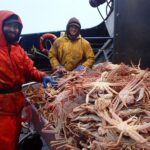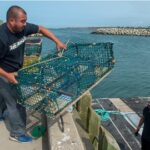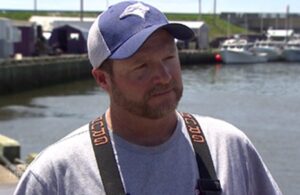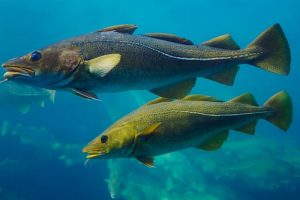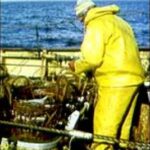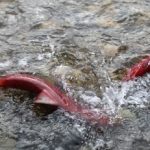Tag Archives: climate change
Summer flounder stirs north-south climate change battle.
 Editor’s Note: “Climate at Your Doorstep” is an effort by The Daily Climate to highlight stories about climate change impacts happening now. The summer flounder – one of the most sought-after catches on the U.S. East Coast – is stirring up a climate change battle as it glides through the sand and grasses at the bottom of a warming North Atlantic. Read more here 10:11
Editor’s Note: “Climate at Your Doorstep” is an effort by The Daily Climate to highlight stories about climate change impacts happening now. The summer flounder – one of the most sought-after catches on the U.S. East Coast – is stirring up a climate change battle as it glides through the sand and grasses at the bottom of a warming North Atlantic. Read more here 10:11
Time to rethink fishery management?
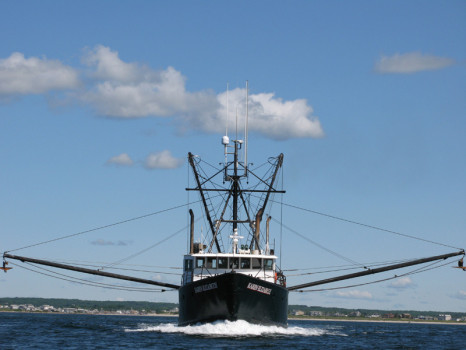 Fishery management traditionally has focused on fishing pressure, the removal of animals from a population with nets, lines and traps, as the only statistic worth using in the regulatory equation. The rationale is simple, at least in theory: If the landings in a fishery drop, it’s assumed that the population has declined. Read more here PBN.com 07:12
Fishery management traditionally has focused on fishing pressure, the removal of animals from a population with nets, lines and traps, as the only statistic worth using in the regulatory equation. The rationale is simple, at least in theory: If the landings in a fishery drop, it’s assumed that the population has declined. Read more here PBN.com 07:12
As Our Climate Changes, We Must Base Our Policies in Sound Science – Richard Merrick, Chief Scientist for NMFS
 For some people, climate change is just a theoretical possibility. But ask fishermen, and many will tell you that climate change is well underway. Along the Atlantic Coast, commercially valuable species of fish, including silver hake and winter flounder, are moving north to stay within their preferred temperature range. Read more here noaa.gov 16:47 about nmfs
For some people, climate change is just a theoretical possibility. But ask fishermen, and many will tell you that climate change is well underway. Along the Atlantic Coast, commercially valuable species of fish, including silver hake and winter flounder, are moving north to stay within their preferred temperature range. Read more here noaa.gov 16:47 about nmfs
Over demanding market affects fisheries more than climate change
 Summary: Fisheries that rely on short life species, such as shrimp or sardine, have been more affected by climate change, because this phenomenon affects chlorophyll production, which is vital for phytoplankton, the main food for both species. Read more here sciencedaily 16:37
Summary: Fisheries that rely on short life species, such as shrimp or sardine, have been more affected by climate change, because this phenomenon affects chlorophyll production, which is vital for phytoplankton, the main food for both species. Read more here sciencedaily 16:37
Computer Model Predictions: Major Reductions in Seafloor Marine Life from Climate Change by 2100
 An international team of scientists predict seafloor dwelling marine life will decline by up to 38 per cent in the North Atlantic and over five per cent globally over the next century. These changes will be driven by a reduction in the plants and animals that live at the surface of the oceans that feed deep-sea communities. As a result, ecosystem services such as fishing will be threatened. Read more@sciencedaily 11:13
An international team of scientists predict seafloor dwelling marine life will decline by up to 38 per cent in the North Atlantic and over five per cent globally over the next century. These changes will be driven by a reduction in the plants and animals that live at the surface of the oceans that feed deep-sea communities. As a result, ecosystem services such as fishing will be threatened. Read more@sciencedaily 11:13
The other CO2 problem: Oceans are becoming more acidic
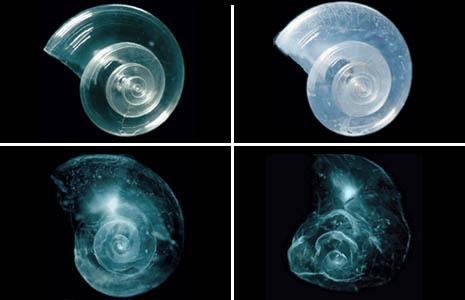
We often hear about climate warming and melting arctic sea ice in the news, but have you ever wondered what effect climate change is having on our oceans? more@homernews 14:30
Climate change changing Gulf of Maine fisheries
 The cod fishery appeared limitless and its value to Europe helped settle and enrich New England and Eastern Canada. Now the much smaller cod that survive are embattled by years of overfishing and other pressures. One of the major pressures is climate change. more@gomtimes 09:53 Plenty of ENGO anecdotes, and climate denialism! “Climate, while important, was not the primary reason for the collapse of cod,” “We did that. We mismanaged our ecosystem. We made that mess.” Tom Dempsey
The cod fishery appeared limitless and its value to Europe helped settle and enrich New England and Eastern Canada. Now the much smaller cod that survive are embattled by years of overfishing and other pressures. One of the major pressures is climate change. more@gomtimes 09:53 Plenty of ENGO anecdotes, and climate denialism! “Climate, while important, was not the primary reason for the collapse of cod,” “We did that. We mismanaged our ecosystem. We made that mess.” Tom Dempsey
There is not a cod collapse. There IS a cod exodus. Canada is being enriched once again, and they look at it as a cod crisis threatening the shrimp and crab they prefer to catch, based on landing value, as flat earthers like Dempsey, Bullard, and Crockett expose themselves as out of touch, preferring to continue the charade of failed fishery management that they are involved with! Tragic.
Sea life relocating fast in response to climate change – Extinctions possible as predators move into new areas
 Many fish and plankton are relocating towards the North and South poles at an astonishing rate of hundreds of kilometres per decade in response to climate change, a new study has found. That is shaking up ecosystems and forcing the fishing industry to adjust. more@cbcnews
Many fish and plankton are relocating towards the North and South poles at an astonishing rate of hundreds of kilometres per decade in response to climate change, a new study has found. That is shaking up ecosystems and forcing the fishing industry to adjust. more@cbcnews
sonofabi,,,a Monterey Bay Aquarium article that never mention’s over fishing! Monterey Bay affected by climate change – State study points to fish declines, ocean acidification
From rising sea levels and ocean acidity to declining populations of chinook salmon and sea lion pups, global warming is here, it said in a 258-page report, “Indicators of Climate Change in California.” more@montereyherald
Tom Dempsey is in Climate Denial. “It wasn’t even the prime driver,”
Calling for “a national voice for fishermen about climate change,” Dempsey also advocated better regional fisheries management and more control by fishermen in setting goals and methods to accomplish broader-based management. continued@portlandpressherald
Climate Change Forces Reevaluation of Fishery Management
For decades, fishery management has focused almost exclusively on the need to restrict fishing. Now, environmental changes are forcing fishermen and regulators to reevaluate their traditional practices.![]()
Climate change threatens extinction for 82 percent of California native fish
Salmon and other native freshwater fish in California will likely become extinct within the next century due to climate change if current trends continue, ceding their habitats to non-native fish, predicts a study by scientists from the Center for Watershed Sciences at the University of California, Davis. continued
Alaska Editorial: Mind the gaps
This week in Anchorage, the state brought in experts to identify the gaps in the draft plan. They received some useful comments. Reviewers urged that more attention be given to ocean acidification, climate change and the ecological effects of the Bering Sea pollock-fishing industry. They also encouraged research into how wild salmon populations are affected by the annual release of millions of fish from commercial hatcheries.http://juneauempire.com/opinion/2012-11-01/alaska-editorial-mind-gaps
Climate change will shift marine predators’ habitat, study says – By Juliet Eilperin, Washington Post
More doom and gloom from a member of the Society of Environmental Journalists (SEJ)
The top ocean predators in the North Pacific could lose as much as 35 percent of their habitat by the end of the century as a result of climate change, according to a study published Sunday in the journal Nature Climate Change.
The analysis, conducted by a team of 11 American and Canadian researchers, took data compiled from tracking 4,300 open-ocean animals over a decade and looked at how predicted temperature changes would alter the areas they depend on for food and shelter. Some habitats could shift by as much as 600 miles while others will remain largely unchanged, the scientists found, and these changes could affect species in different ways.





































